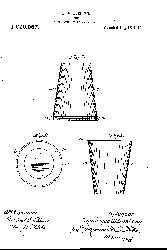At the turn of time moving from the 19thto the 20thcentury, drinking water was hard to find given that indoor plumbing was not the norm and that the embryonic water infrastructure was primarily concerned with fire fighting and sewage. Urban imbibers found most of their water at the neighborhood pump, where a communal tin dipper provided a cup for everyone; and of course invited the possibility of sharing a range of communal diseases, like cholera, typhoid, and dysentery.
Lawrence Luellen, lawyer, an advocate of public health, and entrepreneur developed an ice-cooled water vending machine, where paper cups dispensed a refreshing drink of water for a penny. Recognizing a marketing opportunity his company, the Individual Paper Cup Company of New York, renamed their sole product, that paper cup, the Health Kup. Ultimately, that name morphed into the product we know today, the Dixie Cup. And with its introduction came another innovation, paper-wrapped wooden scoops, for ice cream. The early 1900s brought the concept of one, done, and toss into our consumerism creating a range of products, from razor blades to ballpoint pens.
Even though the disposable paper cup was created with the best of intentions, as a preventative measure for a real public health concern, the scale of its use in modern society has brought concerns about that one, done and toss point of view. Like plastic bags, our use of disposable paper cups is getting a reconsideration, especially by the prominent purveyors, Starbucks, Dunkin Donuts, and McDonald's.
Berkeley, California, the first city to tax sugary beverages is leading the way. They are instituting a 25 cent per cup charge for disposable to-go cups; in a city that throws 40 million cups away annually, that is a $10 million increase – although retailers do not have to pass any or all of that tax on to the customers. Bloomberg News reports that for Starbuck’s 6 billion to-go cups and Dunkin’s 1 billion cups, a shift away from these products may be an “existential crisis.” Their concern is shared with the major producers of those cups, Georgia-Pacific LLC and International Paper Co; it is, after all, a 12 billion dollar business currently.
The difficulty with all those disposables is that they wind up in landfills, a vanishingly small percentage are “recycled.” A big problem with recycling is that the plastic lining of the cups can only be separated from the paper at three sites in the US; and more importantly, when those cups are tossed, they are most often tossed with the plastic lids, that have to be handled and recycled separately. And, as I wrote about plastic and biodegradable bags, the time frame for the return of these disposables to nature is much longer than we think, years, not weeks. A recent industry-sponsored contest sought a replacement for the to-go cup and found at least 12 possible alternatives.
Starbuck’s instituted a surcharge for those disposable in the UK, and it increased the use of a bring-your-own reusable cup by 150% - a sizeable change until you realize that reusable cups are only used by about 5% of patrons. And for a change, Berkeley’s tax is not the usual political bait and switch, where you tax a product and spend the money on something else. The town government surveyed their constituents and determined that the 25 cent charge would influence about 70% of the populace to reuse rather than recycle, at least, for coffee cups. And the monies collected do not come to the municipality, they stay with the store, so perhaps they can be used to offset other to-go options.
As one individual involved in the Berkeley initiative stated, “It [the surcharge] has to be visible to the customer. …That’s what motivates people to change behavior.” Perhaps that is why reuse lags behind recycle; the disposal of our one, done and toss consumerism is done outside of our vision. Maybe seeing garbage barges moving down the Hudson will strike a more sensitive chord. Recycling is part not all of a solution, reuse and dare I suggest less consumption may have a more significant impact.
Source: Starbucks, Dunkin Race Against Bans, Taxes on Disposable Cups Bloomberg News




